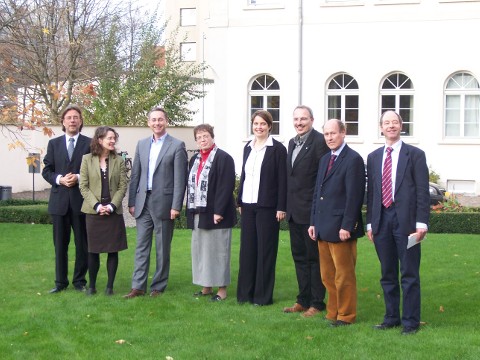


Jürgen Ernst, Mendelssohn-Haus Leipzig, Sprecher der AG Musikermuseen
Prof. Dr. Gisela Weiß, Hochschule für Technik, Wirtschaft und Kultur Leipzig
Simon K. Posch, Haus der Musik Wien
Friederike Böcher, Heinrich-Schütz-Haus Bad Köstritz, Sprecherin der AG Musikermuseen
Katja Margarethe Mieth, Sächsische Landesstelle für Museumswesen Chemnitz
Dr. Andreas Grünewald Steiger, Bundesakademie für kulturelle Bildung Wolfenbüttel
Dr. Michael Ladenburger, Beethoven-Haus Bonn
Dr. Christian Mühne, Richard-Wagner-Museum Graupa
Der Erfahrungsaustausch der Mitglieder der Arbeitsgemeinschaft Musikermuseen Deutschlands förderte die inzwischen auch anderweitig verbreitete Erkenntnis, daß sich Museen heute nicht mehr nur als Einrichtungen des Sammelns, Bewahrens und Forschens verstehen dürfen, sondern auch in besonderem Maße als Bildungseinrichtungen aktiv werden müssen. Aus diesem Grund hat die Arbeitsgemeinschaft am 10. November 2008 zu einer Podiumsdiskussion im Mendelssohn-Haus Leipzig eingeladen.
Referenten maßgeblicher Institutionen beleuchteten eingangs das Thema "Musikermuseum – Instrument der Bildung" aus verschiedenen Perspektiven und haben damit eine Diskussion unter den Teilnehmenden angestoßen. Die Vorträge können auf dieser Seite eingesehen und heruntergeladen werden.
Die Veranstaltung wurde gefördert vom Beauftragten der Bundesregierung für Kultur und Medien aufgrund eines Beschlusses des Deutschen Bundestages.
Vortrag von Dr. Andreas Grünewald Steiger, Bundesakademie für kulturelle Bildung Wolfenbüttel
Beitrag von Simon K. Posch, Haus der Musik Wien
Vortrag von Dr. Michael Ladenburger, Beethoven-Haus Bonn
Deutschland verfügt über musikalische Traditionen und Nachlässe von außerordentlichem Wert: Händel, Schütz und Bach, Beethoven, Mendelssohn, Schumann, Brahms und Wagner sind - um nur einige Namen zu nennen - weltweit bekannte und geschätzte Komponisten. Ihr Wirken hat eine einzigartige Musiklandschaft wesentlich mitgeformt.
Zahlreiche Orchester, Chöre und Ensembles, renommierte Musikfestivals und -reihen, Musikerhäuser mit Museen, öffentliche Archive und Bibliotheken, aber auch private Sammlungen bewahren ihr musikalisches Erbe.
Diesen unschätzbaren Fundus gilt es immer wieder neu zu beleben und für die Gegenwart zu erschließen. Den in der Arbeitsgemeinschaft Musikermuseen Deutschlands zuusammengeschlossenen Häusern kommt dabei eine wichtige Rolle zu. In ihnen begegnen wir dem Werk von Musikern und Komponisten, die die Kulturnation Deutschland außerordentlich bereichert haben. Über das individuelle Portrait, über die Vermittlung des einzelnen Œuvres hinaus tragen die Musikermuseen aber auch zur Pflege musikalischer Tradition insgesamt bei. Die vorliegende Broschüre unterstreicht diesen Aspekt der Zusammenschau, und sie lädt zu einer Reise in die Musikgeschichte Deutschlands ein. Ich wünsche diesem Reiseführer regen Gebrauch und eine große Resonanz.
Bernd Neumann, MdB
Staatsminister bei der Bundeskanzlerin
Der Beauftragte der Bundesregierung für Kultur und Medien
Zitat: Vorwort zur Broschüre der Arbeitsgemeinschaft "Musikermuseen in Deutschland", 2007.